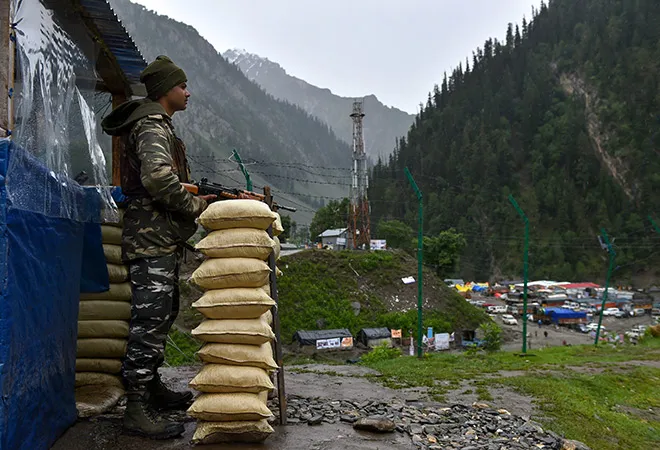-
CENTRES
Progammes & Centres
Location
For the first time in last four years, the Modi government has expressed a willingness to hold talks with the Hurriyat. The acknowledgment of separatists as stakeholders by the Modi government in itself is a big development.

Image Source: PTI
Army personnel display cache of arms recovered from militants during an encounter at Tangdar, north Kashmir — 20 May
Kashmir’s separatist leaders are at it again — scuttling the Government of India’s efforts to begin the dialogue process. Conflicting and divergent statements came from the three Hurriyat leaders — octogenarian Syed Ali Shah Geelani, Mirwaiz Umar Farooq and Yasin Malik — after Union Home Minister Rajnath Singh’s offer of talks appeared to have taken them by surprise.
In an interview to The Indian Express, Union Home Minister Rajnath Singh had said the government is willing to talk to “those who want to talk.” This unambiguous statement rekindled a fresh wave of enthusiasm in Srinagar. Coming right after the unilateral ceasefire initiative of the Government of India, this marked a paradigm shift in New Delhi’s Kashmir policy.
For the first time in last four years, the Modi government has expressed a willingness to hold talks with the Hurriyat. The acknowledgment of separatists as stakeholders by the Modi government in itself is a big development. In the past, the government’s adversarial and non-compromising position came with a clear message: We want no business with Hurriyat. Even after the appointment of Dineshwar Sharma as an interlocutor in October 2017, the Government of India had maintained ambiguity on talks with the Hurriyat.
For the BJP, this massive climb-down from its earlier position on the Hurriyat is a big bet. The change of policy can cause serious electoral damages in the upcoming State elections and the general election in 2019. Despite that, it seems, the government is keen to set the ball rolling for negotiations.
But, in reaction to Rajnath Singh’s offer for talks, the incorrigible Geelani pulled out an old nuskah from his pack of cards — the moth-eaten five-point proposal of 2010. In the aftermath of the 2010 unrest, Geelani had put forth five stringent conditions for negotiations, which include declaring Kashmir issue as an international dispute, the withdrawal of troops from Jammu and Kashmir, the revocation of AFSPA and other laws, release of political prisoners and investigations into the civilian deaths of 2010 unrest.
While any casual observer will notice the drastic change of the situation in Kashmir, Geelani, however, remains still adamant on his old shenanigans. The recent upswing in violence in Kashmir and the new wave of militancy have caused tremendous stress on the common Kashmiri. There is also wider consensus both in Srinagar and New Delhi that a peace process to end the violence is needed. The stringent positions will only complicate matters. Geelani’s five-point proposal not only scuttled the dialogue process post-2010 — it also paved the foundation for the current mess. Digging out the rags of 2010 shows how the old man is unwilling to recognise the new realities just for the sake of optics — to appear unshakeable and more hardline than ever. His five-point proposal has been a constant condition for rejecting talks since 2010.
"While any casual observer will notice the drastic change of the situation in Kashmir, Geelani, however, remains still adamant on his old shenanigans. The recent upswing in violence in Kashmir and the new wave of militancy have caused tremendous stress on the common Kashmiri."
In contrast to Geelani, another noticeable change in the position of the central government is that the rider of ‘talks within the framework of the Constitution’ has taken the back seat. So far, the government has not put any conditions for the talks. But even the unilateral Ramzan ceasefire received a negative response from the separatist trio, quite contrary to the reaction of civil society in Kashmir. The Hurriyat rejected it as a “cruel joke.” The Hurriyat could have played a role in convincing the militant groups to follow suit after the announcement of the government. Not even a token statement was issued in this regard.
Despite the fresh recruitments of local boys in militanct ranks after the ceasefire, rifle snatching bids, attacks on the security forces and civilians, the Non-Initiation of Combat Operations is still in place.
This raises a serious question: Is the Hurriyat ready for a peace process in Kashmir?
Syed Ali Shah Geelani has always maintain a pathological aversion towards the dialogue process. In the heydays of Pakistan President Gen. Pervez Musharraf, the dialogue process did, in fact, come very close to the settlement of the Kashmir issue. The kind of consensus on the dialogue process in India, Pakistan and also the State of Jammu and Kashmir during Musharraf’s time was unparalleled in the history, but even then Geelani was a spoiler. Gen. Musharraf’s famous reprimand to Geelani for causing roadblocks in the dialogue process, in essence, meant: “Get out of the way, old man.”
"Is the Hurriyat ready for a peace process in Kashmir?"
There is a clear difference in the individual and collective stand of the three separatists on the dialogue offer. While Geelani jumped the gun by putting the five-point condition for talks, the joint statement of Mirwaiz, Geelani and Yasin Malik asked New Delhi to clear the confusion on what it wants to talk about. The statement, however, did not mention a word on Geelani’s five-point condition.
The ‘confusion’ in the head of separatists, as per the joint statement of the three Hurriyat leaders, has risen from different statements on the talks. The statement read: “While Mr. Rajnath says there should be dialogue with both Kashmir and Pakistan. Foreign Minister Sushma Swaraj puts a rider and says no talks with Pakistan unless terror is stopped.” Then, BJP President Amit Shah gives a spin to the ceasefire, saying that it (ceasefire) is not for militants but (for) the people while the State DG had issued a statement that it’s for militants to come back home. All this ambiguity leaves little room to consider the talks about talks seriously with a purpose or warrant a response.”
First, the reaction to the statement of Sushma Swaraj should come from the foreign office of Pakistan. Second, the separatists have failed to have either read or comprehended her entire statement as she asserted that the NSA level talks and track-two dialogue will continue. Reiteration of the 2003 LOC ceasefire by the DGMOs of the two countries could very well be an outcome of the NSA-level talks, a clear indicator of the forward movement between India and Pakistan. Third, it is a gross miscalculation to read Amit Shah’s political statement as the stand of the Government of India, and his “spin” does in no way violate the spirit of the ceasefire initiative. Fourth, comparing and equating the statement of Director General of J&K Police to the central government’s position is another misreading, as the DGP is the head of the State police and reports to the Chief Minister of the State.
Given the noises coming from the Hurriyat, it seems the initiative has taken them by surprise and they are not ready for the dialogue and unwilling to see the sea of change that have occurred in Kashmir in the last few years. Seeking assurances may be right, but putting stringent conditions to start the negotiations itself will scuttle the process. Reading the joint statement of the three Hurriyat leaders in the context of Geelani’s earlier (individual) statement and the conspicuous silence from Yasin Malik, the internal differences between the three leaders are clearly visible. To gloss over these internal differences, the separatist leaders are creating a bogey by saying New Delhi is “unclear and ambiguous” about the talks.
The views expressed above belong to the author(s). ORF research and analyses now available on Telegram! Click here to access our curated content — blogs, longforms and interviews.

Khalid Shah was an Associate Fellow at ORF. His research focuses on Kashmir conflict Pakistan and terrorism.
Read More +